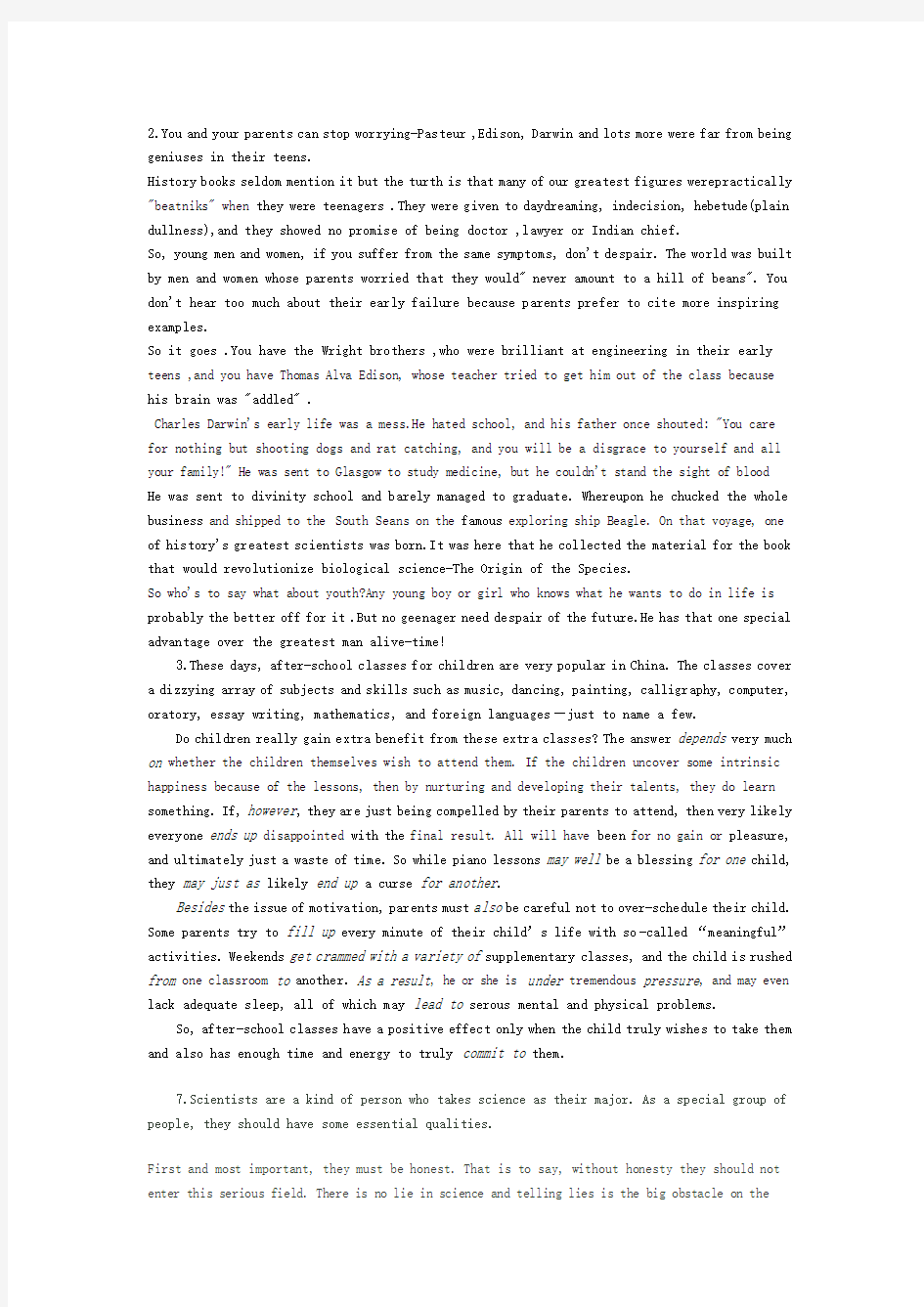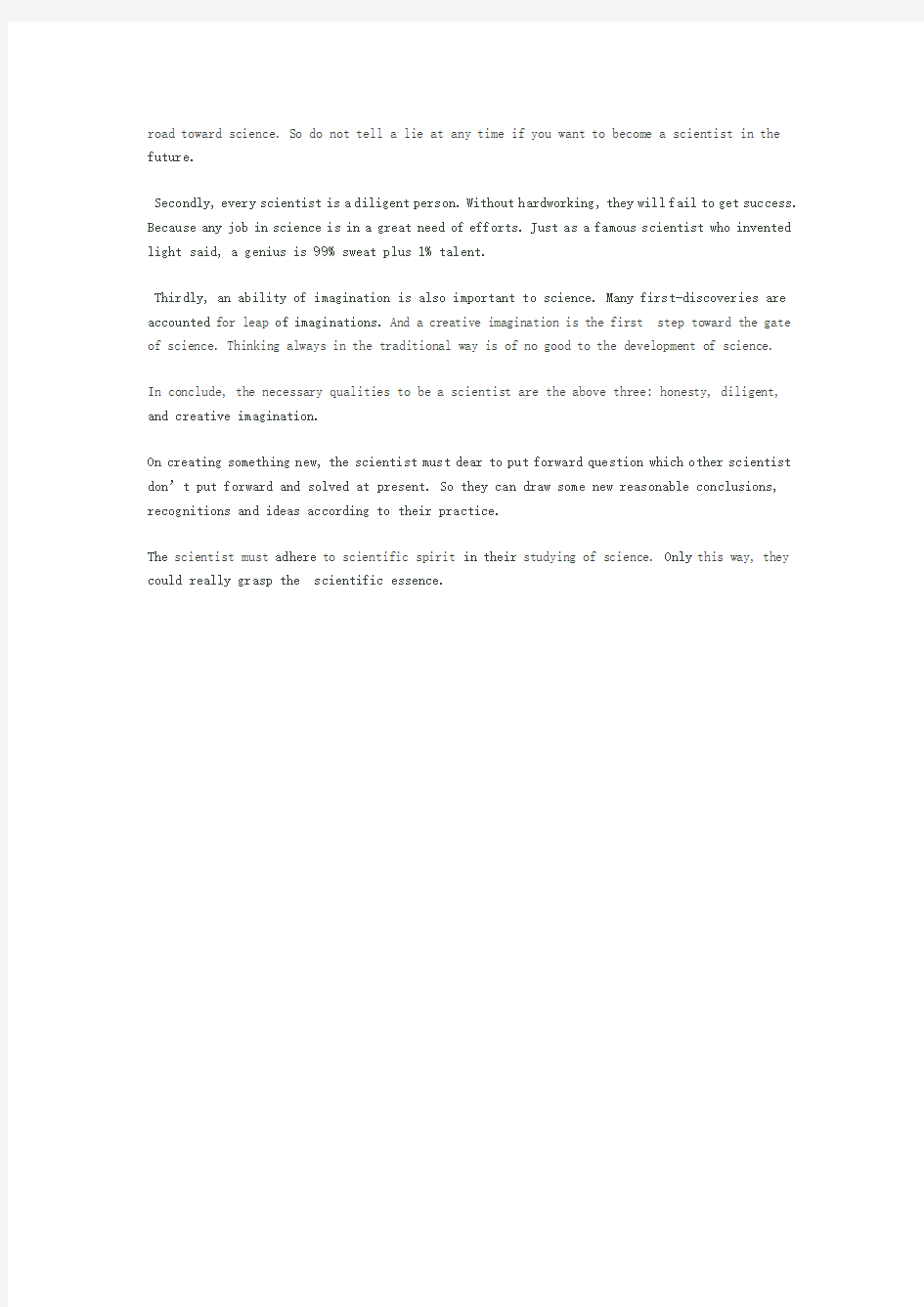Unit 3--Writing Practice


2.You and your parents can stop worrying-Pasteur ,Edison, Darwin and lots more were far from being geniuses in their teens.
History books seldom mention it but the turth is that many of our greatest figures werepractically "beatniks" when they were teenagers .They were given to daydreaming, indecision, hebetude(plain dullness),and they showed no promise of being doctor ,lawyer or Indian chief.
So, young men and women, if you suffer from the same symptoms, don't despair. The world was built by men and women whose parents worried that they would" never amount to a hill of beans". You don't hear too much about their early failure because parents prefer to cite more inspiring examples.
So it goes .You have the Wright brothers ,who were brilliant at engineering in their early teens ,and you have Thomas Alva Edison, whose teacher tried to get him out of the class because his brain was "addled" .
Charles Darwin's early life was a mess.He hated school, and his father once shouted: "You care for nothing but shooting dogs and rat catching, and you will be a disgrace to yourself and all your family!" He was sent to Glasgow to study medicine, but he couldn't stand the sight of blood He was sent to divinity school and barely managed to graduate. Whereupon he chucked the whole business and shipped to the South Seans on the famous exploring ship Beagle. On that voyage, one of history's greatest scientists was born.It was here that he collected the material for the book that would revolutionize biological science-The Origin of the Species.
So who's to say what about youth?Any young boy or girl who knows what he wants to do in life is probably the better off for it .But no geenager need despair of the future.He has that one special advantage over the greatest man alive-time!
3.These days, after-school classes for children are very popular in China. The classes cover
a dizzying array of subjects and skills such as music, dancing, painting, calligraphy, computer, oratory, essay writing, mathematics, and foreign languages—just to name a few.
Do children really gain extra benefit from these extra classes? The answer depends very much on whether the children themselves wish to attend them. If the children uncover some intrinsic happiness because of the lessons, then by nurturing and developing their talents, they do learn something. If, however, they are just being compelled by their parents to attend, then very likely everyone ends up disappointed with the final result. All will have been for no gain or pleasure, and ultimately just a waste of time. So while piano lessons may well be a blessing for one child, they may just as likely end up a curse for another.
Besides the issue of motivation, parents must also be careful not to over-schedule their child. Some parents try to fill up eve ry minute of their child’s life with so-called “meaningful” activities. Weekends get crammed with a variety of supplementary classes, and the child is rushed from one classroom to another. As a result, he or she is under tremendous pressure, and may even lack adequate sleep, all of which may lead to serous mental and physical problems.
So, after-school classes have a positive effect only when the child truly wishes to take them and also has enough time and energy to truly commit to them.
7.Scientists are a kind of person who takes science as their major. As a special group of people, they should have some essential qualities.
First and most important, they must be honest. That is to say, without honesty they should not enter this serious field. There is no lie in science and telling lies is the big obstacle on the
road toward science. So do not tell a lie at any time if you want to become a scientist in the future.
Secondly, every scientist is a diligent person. Without hardworking, they will fail to get success. Because any job in science is in a great need of efforts. Just as a famous scientist who invented light said, a genius is 99% sweat plus 1% talent.
Thirdly, an ability of imagination is also important to science. Many first-discoveries are accounted for leap of imaginations. And a creative imagination is the first step toward the gate of science. Thinking always in the traditional way is of no good to the development of science.
In conclude, the necessary qualities to be a scientist are the above three: honesty, diligent, and creative imagination.
On creating something new, the scientist must dear to put forward question which other scientist don’t put forward and solved at present. So they can draw some new reasonable conclusions, recognitions and ideas according to their practice.
The scientist must adhere to scientific spirit in their studying of science. Only this way, they could really grasp the scientific essence.
